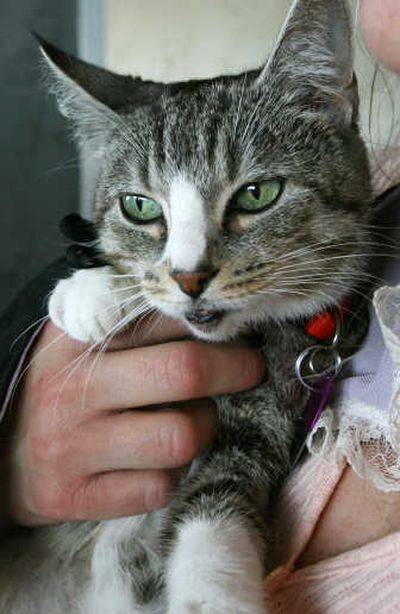Introduce pet to baby with caution

The arrival of a new baby into a household is an exciting event, but also a little bit frightening. This is true for new parents and siblings, but it is equally true for their pets. New smells, sounds and schedules will cause your dog or cat some stress. There are a number of things you can do to make their adjustment easier. There are also a few things to do well before the arrival to ensure that your pets are in good health and free of disease.
Although it is impossible to predict your schedule with a new child at home, anticipate being preoccupied and unable to spend the amount of time with your pet that she was accustomed to.
Several weeks before the child arrives, start to get your pet used to spending more time alone or with other caregivers. But at the same time, give your dog or cat 10 minutes a day of uninterrupted, loving attention. Pet the animal gently and give treats, brushing or roughhousing. Just tailor what you do to what she most enjoys. Continue this routine after the baby arrives. Your pet will look forward to this time each day, and it will be an event she can count on, even when everything else in the household is in flux.
For some very “high stress” cats and dogs, it can help to play recordings of babies crying, so the pet can become accustomed to this sound. The goal is for the sound to become so familiar that your pet ignores it and goes about his business.
Although you won’t allow your pets to be in the nursery unattended with the baby, it is beneficial for them to explore it as you prepare it. They’ll get used to some of the new smells and sights in the room. After the new child arrives, but before you bring the baby home, have someone bring an article of clothing that he has worn, for your pet to investigate.
The homecoming
When you first come home, have someone else carry the baby. You enter the house first, and greet your pets as you would have any time you’d been away for a while. Let them calm down before introducing them to the baby.
The introduction
You probably already have some idea of how your pet is likely to react. If your dog has always been accepting of other people, dogs and cats, and has not been aggressive in other situations, she will probably do fine with the baby. Most cats will sniff at the baby to see what it is, and then quickly decide to retire to another part of the house. However, you can’t predict your pet’s reaction with absolute certainty, so always have another person with you and have dogs on a leash in case they must be led away from the room. Ideally, your dog responds to simple verbal commands, so you can tell him sit or down if he seems overly exuberant in investigating the new baby. You should hold the baby on your lap and not dangle it in front of the dog. Talk calmly and praise your dog or cat for gentle, friendly behavior. If something bothers you about the interaction, and you continue to worry about potential aggressiveness, talk to your veterinarian.
Keeping baby safe
Never allow your pet to be alone with your infant. Even when aggression is not intended, dogs or cats could accidentally injure a helpless infant. Keep the nursery door closed (after ensuring no pets have slipped in), and use your baby monitor to hear what is going on.
Importantly, before your new baby arrives, have a veterinarian examine your pet to make sure he is healthy. It is especially important to make sure your pet is free of external parasites such as fleas and internal parasites, such as roundworms. Bring a fresh sample of your pet’s stool to the appointment so it can be checked.
As your family grows, there are bound to be some bumps in the road. With a little forethought and compassion, you can make the transition easier for the four-legged kids, and smooth the road for the entire family.